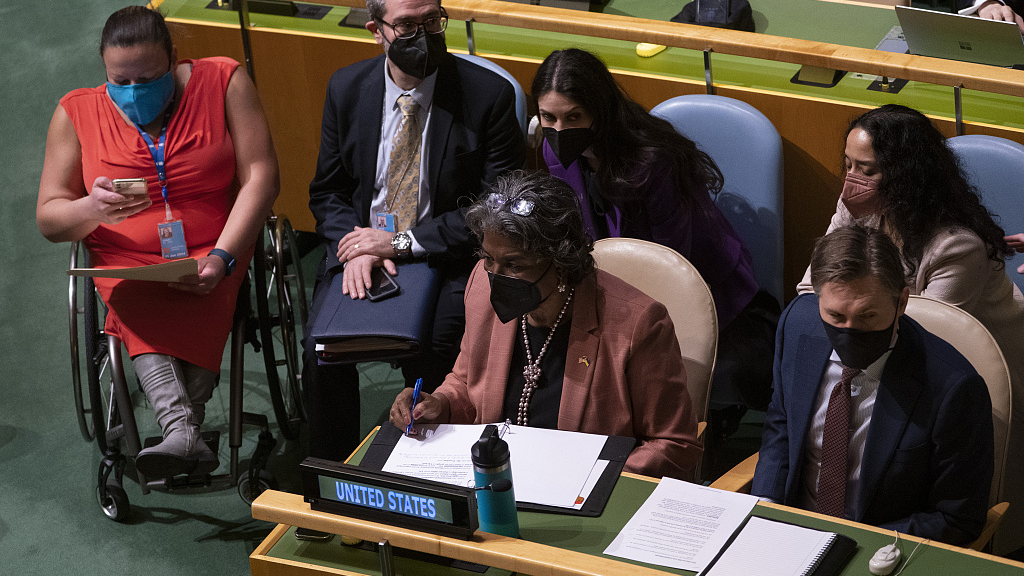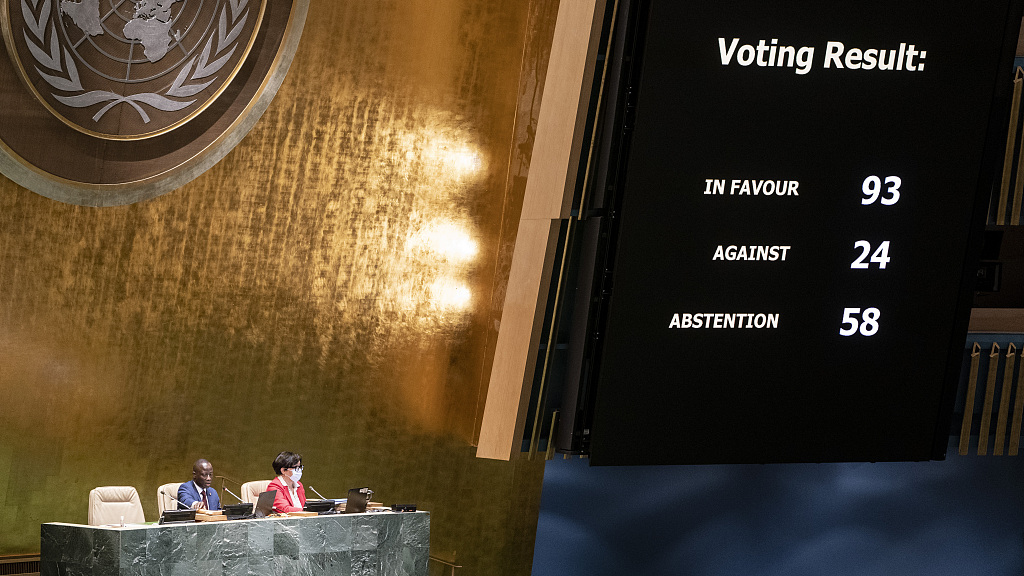
Linda Thomas-Greenfield, permanent representative of the United States to the United Nations, center, sits with her delegation while Sergiy Kyslytsya, permanent representative of Ukraine to the United Nations, speaks during a meeting of the UN General Assembly at the UN headquarters, April 7, 2022. /VCG
Linda Thomas-Greenfield, permanent representative of the United States to the United Nations, center, sits with her delegation while Sergiy Kyslytsya, permanent representative of Ukraine to the United Nations, speaks during a meeting of the UN General Assembly at the UN headquarters, April 7, 2022. /VCG
Editor's note: Anthony Moretti is an associate professor at the Department of Communication and Organizational Leadership at Robert Morris University. The article reflects the author's opinions and not necessarily those of CGTN.
The United Nations Human Rights Council (UNHRC) has made a decision it might come to regret. And one has to wonder if the august body was doing the bidding of certain nations when it made its choice.
A few days ago, the UNHRC announced it was suspending Russia's membership, citing the events unfolding in Ukraine. According to the United Nations, "disturbing photos emerged from the city of Bucha, a city in the suburb of the capital Kyiv, where hundreds of (280) civilian bodies were found in the streets and in mass graves following Russia's withdrawal from the area," and those images justified the suspension.
Soon after the suspension was announced, Russia's deputy permanent representative and ambassador to the UN Gennady Kuzmin said his country was quitting the council. He called the decision an "illegitimate and politically motivated step."
Not surprisingly, the U.S. was in full throat support of the move to further penalize Russia on the global stage. After the vote, the U.S. Secretary of State issued a statement arguing "we have seen growing evidence of Russia's brutal disregard for international law and human rights in Ukraine, most notably in the death and devastation it has caused in communities such as Bucha, Irpin, and Mariupol. The atrocities the world has witnessed appear to be further evidence of war crimes, which serves as another indication that Russia has no place in a body whose primary purpose is to promote respect for human rights."
Was there no "brutal disregard for international law and human rights" when the U.S. unleashed what one official from the George W. Bush administration boldly called "shock and awe" roughly two decades ago in Iraq? Were there not "atrocities the world has witnessed" evident in the two-decade war the U.S. led in Afghanistan? According to the Watson Institute at Brown University, more than 200,000 civilians died in both countries as a result of U.S. aggression. Total number of UNHRC suspensions? Zero.

A completed resolution vote tally to affirm the suspension of Russia from the United Nations Human Rights Council is displayed during a meeting of the UN General Assembly, at UN headquarters, New York City, U.S., April 7, 2022. /VCG
A completed resolution vote tally to affirm the suspension of Russia from the United Nations Human Rights Council is displayed during a meeting of the UN General Assembly, at UN headquarters, New York City, U.S., April 7, 2022. /VCG
While I accept that no two military incursions are equivalent, how is it not possible that questions about human rights ought not be asked about Iraq and Afghanistan by "a body whose primary purpose is to promote respect for human rights?" Granted, the UNHRC was formed in 2006, so it was not positioned to immediately sanction the U.S. when it began its reckless wars in Iraq and Afghanistan. Nevertheless, the images of physical destruction of building after building in Ukraine were similar in Iraq and Afghanistan. And images of families being split up and frightened in Ukraine were similar in Iraq and Afghanistan.
The West asserts that human rights are timeless and universal, but apparently abuses of such rights are not so when certain countries are involved. Ironically, the only other previous suspension ever issued by the UNHRC was against Libya, another long-time foe of the West. Is that a coincidence?
Many Western media in past days have trumpeted American support for the move to suspend Russia while ignoring the fact that the U.S. also quit the UNHRC. It did so in 2018 to demonstrate its support for Israel, which continues to face strident criticism within the UN for its policies relating to the Palestinians. It was only last year that the U.S. returned to the Council.
China was among the nations that smartly voted against the measure to suspend Russia. The country's permanent representative and ambassador to the UN, Zhang Jun, was quoted by Reuters as saying, "Such a hasty move at the General Assembly (UNGA), which forces countries to choose sides, will aggravate the division among member states and intensify the confrontation between the parties concerned - it is like adding fuel to the fire."
Chinese Foreign Ministry spokesperson Zhao Lijian said that "China opposes the politicization or instrumentalization of human rights issues, and opposed exerting pressure on other countries in the name of human rights."
Ambassador Zhang and spokesperson Zhao are correct: Any action at this point that further isolates Russia runs the risk that Moscow will not listen to legitimate overtures to end its special military operation in Ukraine. On top of that, the more the international community locks onto the idea that Russia is beyond the mainstream, the longer it will take to rebuild Ukraine and reunite families.
The world's focus right now must be to end the fighting and restore the peace. That cannot happen if the UN does what Ambassador Zhang stated: Adding fuel to the fire.
(If you want to contribute and have specific expertise, please contact us at opinions@cgtn.com. Follow @thouse_opinions on Twitter to discover the latest commentaries on CGTN Opinion Section.)

